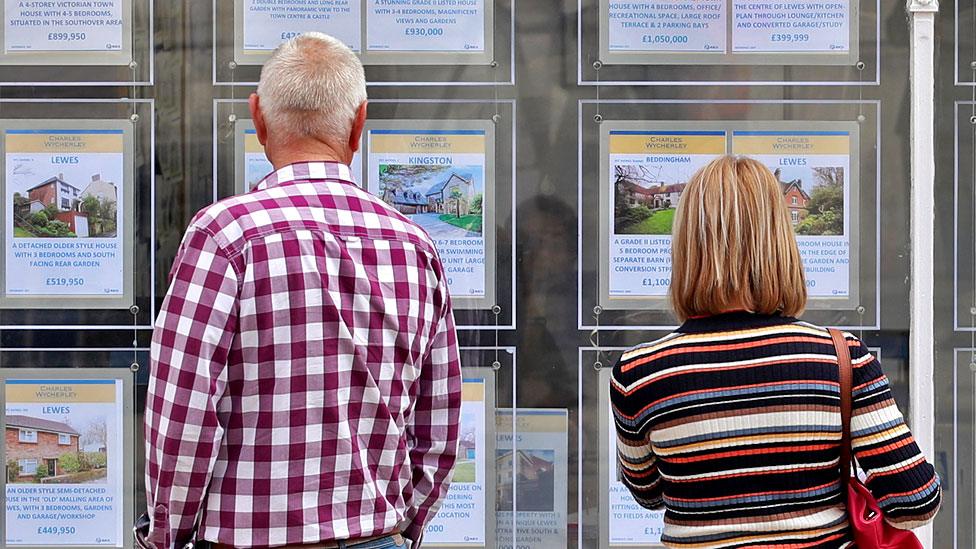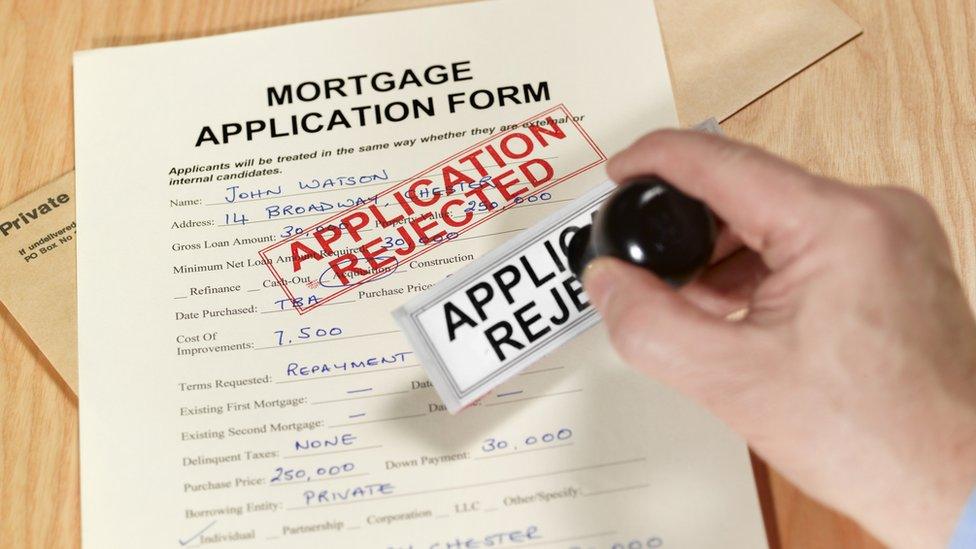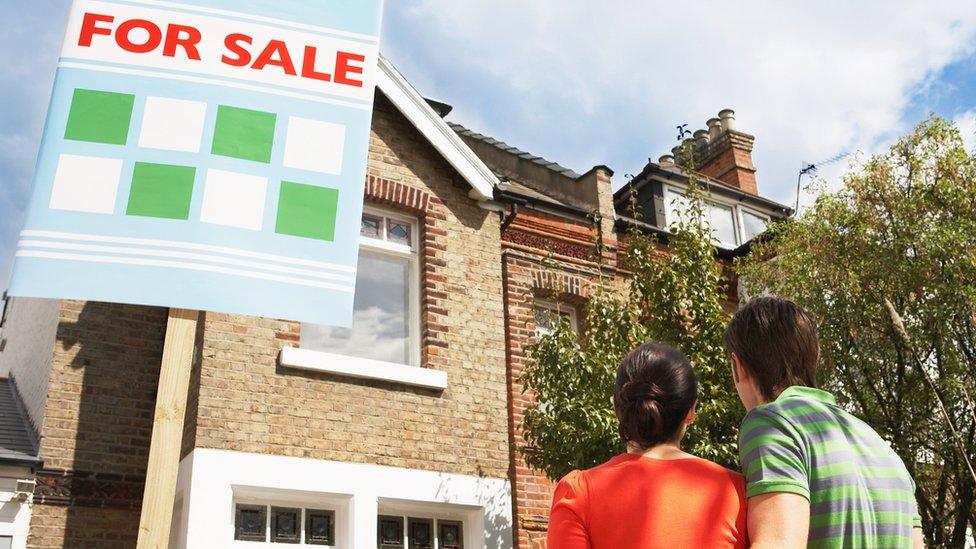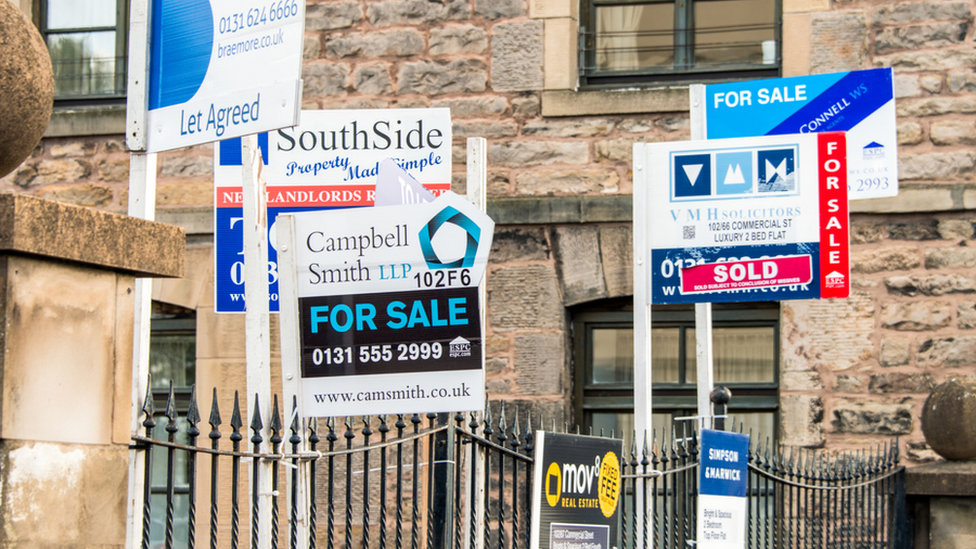How will a recession hit the UK housing market?
- Published

The Bank of England has warned that Britain will lurch into recession later this year, but how will that affect the housing market?
It will be the first UK recession since 2020 - at the height of the Covid crisis.
That actually boosted property prices as working from home encouraged both house movers and buyers in a race for space.
The housing market has been rampant ever since as people taking out a mortgage took advantage of low interest rates and a stamp duty holiday, but a recession could finally put the brakes on.
Latest figures from the Halifax bank, published on Friday, showed that house prices climbed 11.8% in the 12 months to July.
However, they slipped by 0.1% month-on-month in July - and that was before the Bank of England raised interest rates to 1.75% to tackle soaring inflation.
"While we shouldn't read too much into any single month, especially as the fall is only fractional, a slowdown in annual house price growth has been expected for some time," said Halifax managing director Russell Galley.
What a recession could do is tackle the main driver of rising house prices which is lack of supply.
But getting to the point where there are plenty of home available to buy at lower prices might not be pleasant.
"Repossessions may increase as people struggle to pay for the increased cost of living and mortgage payments and therefore more stock may find its way onto the market," said Karen Noye, mortgage expert at Quilter.
Getting on the property ladder
The biggest risk for hopeful homebuyers in a recession is losing their job.
Assuming work remains steady, then a recession could actually help some people climb onto the property ladder if it pushes property prices down, as some experts predict.
That would lead to smaller deposits being needed and lower total amounts borrowed.
But that must be balanced against rising mortgage rates.
Property website Rightmove has calculated that first-time homebuyers would see their monthly mortgage payments climb to an average of 40% of their gross salary after this week's rate rise.
That's a level not seen since 2012, it said.

It calculates that the average monthly mortgage payment for a new homeowner will increase to more than £1,000, up from £813 in January.
The figures are based on the average asking price of a first-time buyer's home being £224,943.
Against that background, forecasts that inflation is set to climb even higher will pile more pressure on people who are saving for a deposit while grappling with a cost-of-living squeeze.
If they're forced into cutting back on non-essentials then their monthly savings towards a deposit may have to be curtailed.
Coping with mortgage rate rises
The Bank of England's rate hike leaves borrowers on tracker mortgages or standard variable rates (SVR) needing to find extra cash to meet their monthly mortgage repayments.
According to UK Finance, there are 1.9 million borrowers affected, with almost two-thirds on SVR.
Based on a typical 25-year £200,000 mortgage those on an SVR will end up paying an extra £59, according to August figures published by rates analysts Moneyfacts.co.uk.
Those with a tracker mortgage will face an extra monthly charge of £52.
Most won't be hit immediately, with only online bank First Direct changing rates immediately after the Bank's announcement.
Others said the new higher rates will hit borrowers from the start of September.

One simple way to help with potential future rate rises is to fix your mortgage.
The advantage of a fixed-rate is knowing how much monthly repayments will be for the length of the loan, which can help with budgeting.
The average five-year fixed rate mortgage has now breached 4%, according to Moneyfacts.co.uk, but experts expect rates to climb even more after the 0.5% base rate hike.
Rachel Springall, finance expert at Moneyfacts.co.uk, reckons finding a low fixed rate now could make sense.
"Borrowers who have not locked into a fixed rate would be wise to move quickly to secure a new deal as interest rates continue to climb," she said.
Redundancy and your home
The biggest risk anyone faces during a recession is losing their job.
That sudden loss of income can mean being unable to meet monthly mortgage repayments and if you miss payments your lender could take steps to repossess your property.
Thankfully lenders aren't keen to do that so anyone finding themselves in that position does have options.
Borrowers with mortgage payment protection insurance should dig out their policy documents and make a claim as soon as possible.
Most policies will cover payments for up to 12 months, giving you some breathing space till you find a new job.
If you don't have insurance and think you may struggle to afford your mortgage payments, it's essential to talk to your lender as soon as possible to discuss your options.
To ease your short-term financial worries you may be able to move to an interest-only loan, for instance, or take a mortgage payment holiday.
Another option could be to extend the term of the mortgage to reduce monthly repayments.
While any of these will help take some of the pressure off you while you're living on a reduced income, it's important to put your mortgage plans back on track when you find work.
If you remain out of work for some time and are claiming benefits, you may be able to claim Support for Mortgage Interest payments from the government.
Falling property values
If property prices fall then, in isolation, that could be good news for potential homebuyers.
But existing homebuyers face the potential risk that their value of their home could end up lower than the amount they've borrowed on a mortgage.
That could leave them in what is known as negative equity.

Long-term homeowners should be immune from that risk as their property value will have far outstripped their mortgage in recent years.
More recent homebuyers who may have taken out a 95% mortgage to buy their dream property, could well see the value dipping below the purchase price if there is a slump in the market.
But, frankly, that only becomes a problem if you want to sell. Keeping a property for a few years has historically helped people ride out the occasional dips in the market.
The last time the property market crashed was after the financial crisis in 2008. Then the average house price in England fell from £188,657 to £159,340 according to Land Registry figures - a drop of 15% in a year.
But by a year later average prices had recovered to £174,765, about 7% lower than two years earlier which would have eased negative equity worries for most homeowners assuming they had kept up with mortgage repayments and reduced the amount borrowed.
One way to ease negative equity fears is to over-pay on your mortgage, if you can afford it.
Related topics
- Published10 May 2024

- Published4 August 2022
- Published5 August 2022
